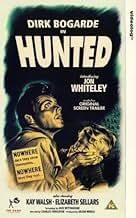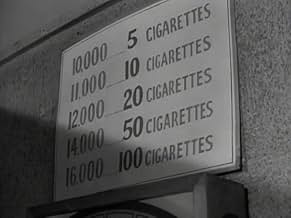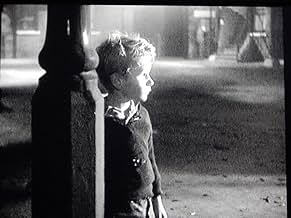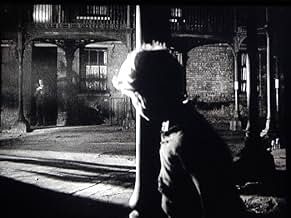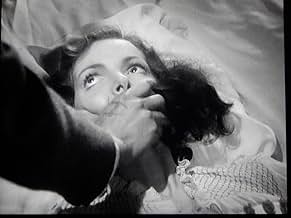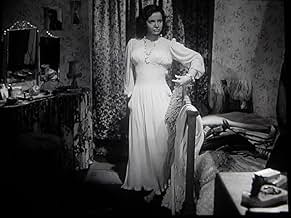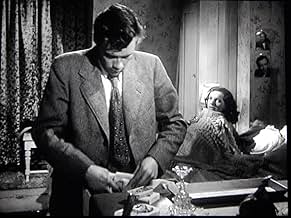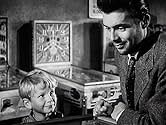IMDb-BEWERTUNG
7,3/10
1492
IHRE BEWERTUNG
Ein gewalttätiger Flüchtling und ein misshandelter kleiner Junge schließen sich zusammen, um vor den Behörden zu fliehen.Ein gewalttätiger Flüchtling und ein misshandelter kleiner Junge schließen sich zusammen, um vor den Behörden zu fliehen.Ein gewalttätiger Flüchtling und ein misshandelter kleiner Junge schließen sich zusammen, um vor den Behörden zu fliehen.
- Regie
- Drehbuch
- Hauptbesetzung
- Auszeichnungen
- 1 wins total
Empfohlene Bewertungen
Right from the start this movie settles its direction straight: A bleak and almost unbearable ambiance surrounds Rob and Chris. They both got nothing to lose and so this unequal pair is ready to be on the run. Every scene is beautifully shot and the actors are really going through the motions. The greatest thing about this movie are teaches of the heart. The "bad" killer is a soft and caring guy whose life as a poor sailor dragged him into this mess.
Think about which society you're living in and why people sometimes do what they have to do...
Outstanding movie by all means!
Buy it now!
Think about which society you're living in and why people sometimes do what they have to do...
Outstanding movie by all means!
Buy it now!
There is a very perceptible difference between Hollywood productions and British filmmaking. Hollywood would have over-dramatized this film. "Big" stars would have been included. The production values would have been pristine, first-rate and in color. And the end result would have been considerably less than that which was produced by British filmmaking. Dick Bogarde was just as good as any 50s Hollywood male star. The child star, Jon Whitely, was exceptional, and some spoiled LA brat could not have done half as well. A film about a murderer trying to escape can be gripping. And a film about a mistreated boy who runs away from home can be very engaging as well. But if you combine those two elements, you have a classic, and this is it.
From the opening scenes of Hunted, directly after the credits, when the dramatic music accompanies a little boy running through the streets of London clutching a teddy bear, we just know this is going to be a great film and it certainly is. Filmed in England and Scotland in late 1951 and released early in 1952, this truly is a wonderful film. The boy is six years old orphaned Scots boy Robbie Campbell (a truly outstanding debut performance by six years old Scots boy Jon Whiteley), who is running and searching for somewhere to hide after accidentally setting the kitchen curtains on fire in his adoptive London home and, believing he has set the house on fire, is fleeing the severe punishment that he believes will be meted out to him by his cruel and violent adoptive father. He ends up running into a derelict building on a bomb site some distance from home where he accidentally comes upon a man, Chris Lloyd (Dirk Bogarde), having just murdered his wife's lover in a crime of passion. Seeing that Robbie has seen the body and is the only witness to his crime, Chris abducts him and takes him on the run with him as he attempts to flee the country and the long arm of the law. Robbie, unloved at home and cruelly treated by his adoptive father, dare not return home and a bond develops between the two fugitives as Robbie flees his adoptive father and Chris flees the police and the hangman's rope.
Chris is at first completely uncaring and rough in his attitude to Robbie, but he gradually takes on the responsibility for Robbie's devotion as the two flee from London and travel up through the midlands to Stoke-on-Trent and then north into Scotland. As the journey gets tougher, Chris has to force Robbie to keep going, to carry him in his arms and to hold him, against the cold, as they sleep out in the wilderness.
It really is a superbly made drama and I read somewhere that, of all the many Rank films Dirk Bogarde made during his long career, this was his personal favourite. It is also a film record of a bygone post-war Britain; from its bomb sites and tramcars and horse drawn traffic in the capital, to the now long gone pottery factories of Stoke on Trent, belching forth their black smoke from huge bottle ovens and covered with industrial grime. The railway scenes in the film were filmed on the equally now long gone Potteries Loop Line at Burslem, Stoke-on-Trent, one of hundreds of lines that fell under the Dr Beeching axe in the 1960's. All completely gone now, but captured for posterity on 35mm black and white film in Hunted.
The film is also a social record of the UK in 1951, a time of general poverty; of post-war austerity and ration books, when everybody dresses so drably. The police in the film may, by modern standards, seem to be having great difficulty in tracking down Chris and Robbie. But you have to take into account the fact that in those days, television was in its infancy; the police had no personal radio communications or computers or helicopters and the pace of life was very different. In real life 1951, a man on the run could quite easily abduct a little boy and take him all over the country with him without being apprehended. So this film then is a contemporary account of how things would have been back in 1951.
Today, in an increasingly paranoid age when, in the minds of many, man abducting little boy equals sex, this film is from a time when characters in films apparently didn't even think of such things. This mindset is no better demonstrated than by one of the police officials in the film who confesses to a colleague that he can't understand what Chris Lloyd wants with the boy. "Why does he hang on to him?" These days, the police would probably put two and two together and make five. However, the story is far more complicated than it would seem at first glance. For the film is not really as much about child abduction as it is about two people of very different ages teaming up in a common cause. Neither of them can go home again and all they have is each other.
Early on in the film, before the loving relationship between Chris and Robbie develops, Chris says to the boy: "You don't like me, do you?" "No", says Robbie. "Well, why don't you go off home, then?" asks Chris. "I don't want to go home", answers Robbie. Hence his decision to stay with Chris. As soon as Robbie gets over the initial shock of being dragged off by Chris at the beginning of the film, he comes to realise that from now on, his only future is with his co-fugitive.
At only six and a half years of age, Jon Whiteley is perfect for this film and comes across variously as scared; devious;furtive and, for a short time, happy to be with Chris and away from his abusive home. His sheer delight at seeing men hay making in a field during the long journey north has to be seen to be believed. Dirk and Jon got on so well together that when the filming finished and they had to part, Jon was reportedly inconsolable. Dirk wanted to adopt the boy, but his friends persuaded him against it. The chemistry between Dirk and Jon is plain to see and what a team they make.
This film is an absolute classic. Beautifully acted; directed and photographed. One of the best British films of the 1950's. 10 out of 10 for this black and white gem.
Chris is at first completely uncaring and rough in his attitude to Robbie, but he gradually takes on the responsibility for Robbie's devotion as the two flee from London and travel up through the midlands to Stoke-on-Trent and then north into Scotland. As the journey gets tougher, Chris has to force Robbie to keep going, to carry him in his arms and to hold him, against the cold, as they sleep out in the wilderness.
It really is a superbly made drama and I read somewhere that, of all the many Rank films Dirk Bogarde made during his long career, this was his personal favourite. It is also a film record of a bygone post-war Britain; from its bomb sites and tramcars and horse drawn traffic in the capital, to the now long gone pottery factories of Stoke on Trent, belching forth their black smoke from huge bottle ovens and covered with industrial grime. The railway scenes in the film were filmed on the equally now long gone Potteries Loop Line at Burslem, Stoke-on-Trent, one of hundreds of lines that fell under the Dr Beeching axe in the 1960's. All completely gone now, but captured for posterity on 35mm black and white film in Hunted.
The film is also a social record of the UK in 1951, a time of general poverty; of post-war austerity and ration books, when everybody dresses so drably. The police in the film may, by modern standards, seem to be having great difficulty in tracking down Chris and Robbie. But you have to take into account the fact that in those days, television was in its infancy; the police had no personal radio communications or computers or helicopters and the pace of life was very different. In real life 1951, a man on the run could quite easily abduct a little boy and take him all over the country with him without being apprehended. So this film then is a contemporary account of how things would have been back in 1951.
Today, in an increasingly paranoid age when, in the minds of many, man abducting little boy equals sex, this film is from a time when characters in films apparently didn't even think of such things. This mindset is no better demonstrated than by one of the police officials in the film who confesses to a colleague that he can't understand what Chris Lloyd wants with the boy. "Why does he hang on to him?" These days, the police would probably put two and two together and make five. However, the story is far more complicated than it would seem at first glance. For the film is not really as much about child abduction as it is about two people of very different ages teaming up in a common cause. Neither of them can go home again and all they have is each other.
Early on in the film, before the loving relationship between Chris and Robbie develops, Chris says to the boy: "You don't like me, do you?" "No", says Robbie. "Well, why don't you go off home, then?" asks Chris. "I don't want to go home", answers Robbie. Hence his decision to stay with Chris. As soon as Robbie gets over the initial shock of being dragged off by Chris at the beginning of the film, he comes to realise that from now on, his only future is with his co-fugitive.
At only six and a half years of age, Jon Whiteley is perfect for this film and comes across variously as scared; devious;furtive and, for a short time, happy to be with Chris and away from his abusive home. His sheer delight at seeing men hay making in a field during the long journey north has to be seen to be believed. Dirk and Jon got on so well together that when the filming finished and they had to part, Jon was reportedly inconsolable. Dirk wanted to adopt the boy, but his friends persuaded him against it. The chemistry between Dirk and Jon is plain to see and what a team they make.
This film is an absolute classic. Beautifully acted; directed and photographed. One of the best British films of the 1950's. 10 out of 10 for this black and white gem.
In the 1950s, Dirk Bogarde played three main sorts of roles in films--sailors or soldiers, the nice Dr. Sparrow in the Doctor movies as well as complete sociopaths. Of these roles, the sociopaths are by far the most interesting to watch. During this time, he often played murderers and crooks on the run. So, when I first started watching "The Stranger in Between", it came as no surprise as he's once again playing a murderer on the run! However, as the film progresses you realize that this seemingly simple film has a lot more depth to it--depth that make it a standout picture.
When the movie begins, a cute little boy is hiding after he'd been playing with matches. He stumbles into the hiding place of Chris (Bogarde)--a guy who is wanted for murder! Chris doesn't want to let the boy go--he could tell people where he's hiding. So he convinces the boy that the police are looking for BOTH of them and they set off together on a cross-country run to avoid capture.
About midway through this movie, you start to notice some things that make it interesting. Chris isn't just a mindless killer--his motivations and what he did exactly aren't quite so black and white. The boy also is not just some scared kid--he's been terribly abused and in some ways he's better off on the run with a killer than staying in his former life! The film also has a few unexpectedly nice moments between the two. Chalk this up to excellent acting, writing and direction. Where is this all going? Well, see the film to find out for yourself.
When the movie begins, a cute little boy is hiding after he'd been playing with matches. He stumbles into the hiding place of Chris (Bogarde)--a guy who is wanted for murder! Chris doesn't want to let the boy go--he could tell people where he's hiding. So he convinces the boy that the police are looking for BOTH of them and they set off together on a cross-country run to avoid capture.
About midway through this movie, you start to notice some things that make it interesting. Chris isn't just a mindless killer--his motivations and what he did exactly aren't quite so black and white. The boy also is not just some scared kid--he's been terribly abused and in some ways he's better off on the run with a killer than staying in his former life! The film also has a few unexpectedly nice moments between the two. Chalk this up to excellent acting, writing and direction. Where is this all going? Well, see the film to find out for yourself.
Although this movie is nearly fifty years old, it had me on the edge of my seat the whole way through. What was going to happen next? Would the characters escape? I can't say much more, without giving away the story except - "Hunted" was brilliantly plotted and directed. Thumbs up to everyone concerned, including Dirk Bogarde as the wanted man, and Jon Whitely as the little boy whom he first used, and then befriended.
Wusstest du schon
- WissenswertesSir Dirk Bogarde (Chris Lloyd) credited this movie with moving him into genuine stardom, and also often claimed that it was one of the very few movies he was in during the 1950s, of which he was proud.
- Zitate
Chris Lloyd: Cup of coffee and a packet of Woodbines please.
[Checks his pockets for change]
Chris Lloyd: You can forget the Woodbines.
- VerbindungenFeatured in Film Profile: Dirk Bogarde (1961)
Top-Auswahl
Melde dich zum Bewerten an und greife auf die Watchlist für personalisierte Empfehlungen zu.
- How long is The Stranger in Between?Powered by Alexa
Details
- Erscheinungsdatum
- Herkunftsland
- Sprache
- Auch bekannt als
- The Stranger in Between
- Drehorte
- Produktionsfirmen
- Weitere beteiligte Unternehmen bei IMDbPro anzeigen
- Laufzeit1 Stunde 24 Minuten
- Farbe
- Seitenverhältnis
- 1.37 : 1
Zu dieser Seite beitragen
Bearbeitung vorschlagen oder fehlenden Inhalt hinzufügen

